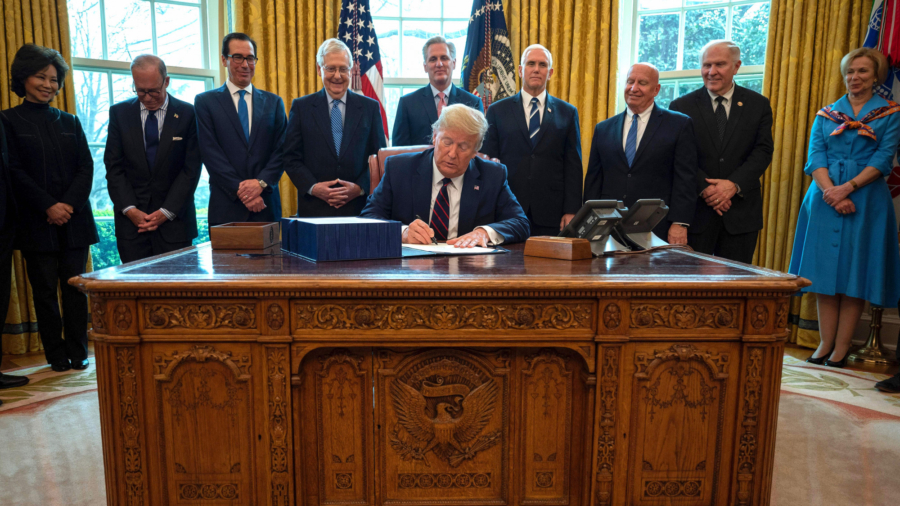President Donald Trump on Friday signed the $2.2 trillion stimulus bill meant to fuel the fight against the CCP virus pandemic and sustain the hard-hit economy as the nation takes drastic measures to stop the spread of the disease.
Prior to signing the bill, Trump called the stimulus package “historic.” The unprecedented measure is the largest stimulus package in the nation’s modern history.
“This will deliver urgently needed relief to our nation’s families, workers and businesses and that’s what this is all about,” Trump said.
The president thanked Republicans and Democrats for “coming together, setting aside their differences and putting America first.”
The stimulus package includes direct payments of $1,200 to most Americans and jobless benefits to millions who have lost jobs. Companies of all sizes will get loans, grants, and tax breaks. The measure includes billions for states and cities as well as the healthcare system.
The House of Representatives passed the bill on a voice vote hours earlier, despite vocal concerns expressed by far-left Democrats and some Republicans. The Senate approved the measure on a 96-0 vote two days earlier.
Lawmakers on both sides of the aisle supported the measure despite opposing some of its provisions. Hours before signing the measure, Trump said it was “90 percent great” but some concessions had to be made to get the Democrats on board.
“I’m going to have to vote for something that has things in it that break my heart,” said Rep. David Schweikert (R-Ariz.).
Although a few speeches on the House floor turned to partisan rhetoric and attacks, most of the lawmakers looked past ideological differences and focused on the urgency of the crisis.
“We have no time to dither,” said Rep. Gerald Connolly (D-Va.) “We have no time to engage in ideological or petty partisan fights. Our country needs us as one.”
The United States had over 90,000 confirmed cases of COVID-19 as Trump prepared to sign the bill. The CCP virus outbreak had killed 1,475 people in the United States as of March 27.
The Epoch Times refers to the novel coronavirus, which causes COVID-19, as the CCP virus because the Chinese Communist Party’s coverup and mismanagement allowed the virus to spread throughout China before it was transmitted worldwide.
The stimulus package includes $500 billion in loans to industries, $100 billion for hospitals, $58 billion in aid to airlines, $150 billion for states and local governments, and $45 billion for disaster relief.
The Department of Defense will receive $10.5 billion, including $1.5 billion for the national guard. The Pentagon has been deploying resources to help states handle the surge of patients with COVID-19.
Americans who meet an income criteria will each receive $1,200. Married couples will receive $2,400 and $500 per child.
Some Republicans raised concerns about funding for seemingly extraneous groups and institutions, including $75 million for the National Foundation on the Arts and the Humanities, $75 million for the National Endowment for Humanities, and $25 million for the J.F. Kennedy Center for the Performing Arts.
The package also allocates $11 billion for three international development groups: the African Development Fund, the African Development Bank, and the International Development Association. While the money for the domestic institutions is tied to responding to the COVID-19 outbreak, the funds to the international groups include no such provision.
The run-up to the vote contained an element of drama because libertarian-conservative Thomas Massie (R-Ky.) announced plans to seek a vote. The leaders of both parties united to prevent that because it would have forced lawmakers back to the Capitol or blemished their voting records if they stayed home. Instead, they made sure enough lawmakers would attend Friday’s session to block Massie’s move under the rules, and lawmakers took the unprecedented step of sitting in the visitors’ galleries to establish the necessary quorum.
Like the Senate, the House promptly adjourned for a weekslong recess but will return later in the spring to consider further legislation.
The bill also seeks to strengthen the safety net for the poor and homeless. Schools and students will get relief, and small business loan payments will be deferred. Evictions from public housing will be put on pause.
Republicans successfully pressed for an employee retention tax credit designed to help companies keep workers on payroll. Companies will also be able to defer payment of the 6.2 percent Social Security payroll tax. A huge tax break for interest costs and operating losses limited by the 2017 tax overhaul was restored at a $200 billion cost, in a boon for the real estate sector.
Most people who contract the CCP virus have mild or moderate symptoms, such as fever and cough that clear up in two to three weeks. For some, especially older adults and people with existing health problems, it can cause more severe illness, including pneumonia, or death.
The Associated Press contributed to this report.
From The Epoch Times


